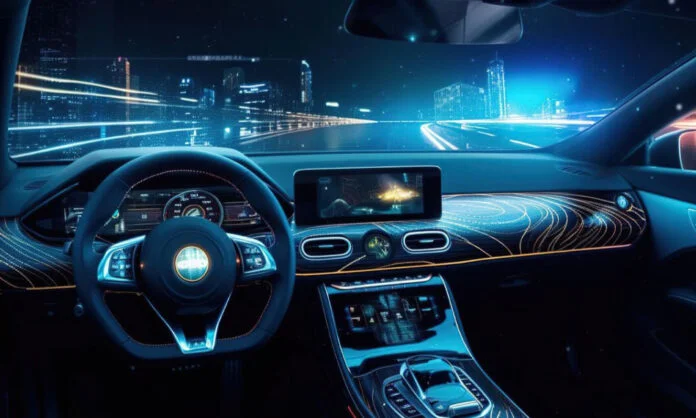The automotive industry is going through a major transition as AI is incorporated into autonomous vehicles. This state-of-the-art technology is opening the door for safer, more intelligent, and environmentally friendly modes of transportation in addition to increasing vehicle economy. From self-driving cars to intelligent traffic systems, artificial intelligence is redefining mobility in the twenty-first century. Take a closer look at how this invention is propelling the automotive industry to greatness.
AI Integration in the Automotive Industry:
Enhancing Vehicle Safety Standards
One of the most significant outcomes of AI in autonomous vehicles is an increase in road safety. By evaluating real-time data from cameras, sensors, and radar, AI-enabled sophisticated systems can anticipate and avert mishaps. For instance, AI is used to make snap decisions for features like autonomous emergency braking, adaptive cruise control, and lane departure alerts—often faster and more accurately than a human driver.
Autonomous vehicles go beyond this. Road fatalities may become rare in the future thanks to autonomous cars’ reduction of human error, which accounts for more than 90% of traffic accidents.
Optimizing Traffic Flow and Reducing Congestion
The optimization of traffic management in autonomous vehicles is another amazing development fueled by AI. To guarantee efficient traffic flow, AI-powered automotive systems may speak with intelligent infrastructure, like traffic signals, and with one another. Fuel usage, travel time, and congestion are all reduced by this technique.
Additionally, cars can reroute depending on real-time traffic data thanks to predictive analytics, which reduces delays and boosts overall efficiency. A crucial first step in creating smart cities is this smooth connectivity between infrastructure and automobiles.
Revolutionizing Passenger Experience
What was once unimaginable is now made a reality very much. AI is improving the driving and passenger experiences. Advanced artificial intelligence (AI) systems used in autonomous cars allow for customization of the in-car experience. AI makes sure every trip is as efficient and enjoyable as possible by modifying climate settings, seat configurations, and entertainment options in addition to recommending favorite routes.
These cars’ voice-activated virtual assistants provide an additional level of convenience by allowing a number of features to be operated hands-free. As a result, commuting is now about enjoying the journey rather than just getting to your destination.
Environmental Sustainability
The global planning towards increasing environmentally suitable and sustainable modes of transportation is further supported by the incorporation of AI into autonomous vehicles. Autonomous cars, for instance, reduce carbon emissions by using machine learning to recognize traffic patterns and modify speed accordingly.
AI also plays a key role in the development of electric vehicle (EV) technologies. With AI systems installed, autonomous EVs may find charging stations in their area, maximize battery life, and even contribute to energy grid management by returning excess energy.
Redefining Automotive Manufacturing
AI is changing the construction of cars as well as the vehicles themselves. AI-powered robots in manufacturing optimize assembly lines, increasing productivity and reducing errors. By making sure that equipment runs at its finest, predictive maintenance lowers the expenses and downtime.
Additionally, AI systems use customer data to forecast demand patterns, assisting automakers in producing cars that meet consumer demands. In the industry, this customer-focused strategy is establishing new benchmarks for creativity and quality.
Challenges and Future Prospects-
Although AI is revolutionizing autonomous vehicles, there are drawbacks as well. To reach the full potential of autonomous vehicles, concerns including cybersecurity, moral decision-making in dire circumstances, and regulatory compliance must be resolved. However, the rate of technical development and continuing research point to a bright future in which these challenges will be resolved.
AI in autonomous vehicles has a bright future ahead of it. Autonomous vehicles are on the verge of achieving intelligence levels that will further revolutionize mobility thanks to developments in machine learning, edge computing, and quantum computing.
On a final note,
The application of AI in autonomous vehicles is delivering in a new era of innovation and excellence for the automotive industry. By improving safety, improving traffic control, altering the passenger experience, promoting sustainability, and revolutionizing manufacturing, artificial intelligence is raising the bar for what automobiles can achieve.
Autonomous vehicles will change how we travel and help create a safer, smarter, and more sustainable society as technology advances. This advancement will be significant and ongoing thanks to the car industry’s dedication to utilizing AI.
Read More:
Applications and Benefits of Augmented Reality across various industries

